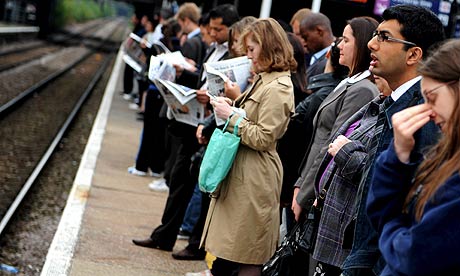
Rail workers are to strike across four days from 6 April, the day after Easter, the head of the RMT union, Bob Crow, has announced today after talks over planned redundancies broke up without agreement.
The RMT said its 5,000 members working as signallers would strike on 6-9 April between 6am and 10am, then 6pm and 10pm . The action will bring the rail network to a standstill at one of the busiest times of the year. Rail workers will ban overtime and rest-day working for the duration of the strike.
"RMT negotiators have worked flat out to try and reach an agreement that protects rail safety, job security and working agreements in the disputes involving signalling and maintenance staff on Britain's railways," Crow said. "Despite long hours of talks we have received nothing concrete from Network Rail that addresses the key issues. It remains the case that Network Rail, in a drive to slash 21% from their budget, want to axe 1,500 maintenance posts, lump maintenance functions on to overworked signallers, rip up agreements and impose changes that will quite clearly undermine safety across our railways and make another Hatfield, Potters Bar or Grayrigg disaster an inevitability."
The strikes were announced despite talks this week at the conciliation service Acas to try to resolve the dispute over NR's plans to cut maintenance jobs and change working practices to allow more work to be done in the evenings and weekends.
The RMT last week refused to rule out the possibility of a national strike – which would be the first for 16 years – over the Easter holiday weekend.
A spokesman for the rail company said talks had made progress but the firm was bracing itself for strike action.
"Network Rail is committed to pursuing a negotiated settlement – our door is always open to further discussions," he said.
"We fully anticipate that the RMT will be announcing strike dates today. Network Rail will do everything it can to run trains to minimise disruption to passengers. Our contingency plans are at an advanced stage."
Railway signal workers narrowly voted in favour of industrial action on Friday, with 54% of RMT members backing strikes on a turnout of 71%. RMT maintenance workers had already voted on 11 March to strike.
Crow has said signal workers might time their strike to coincide with that of Network Rail maintenance staff.
Network Rail has said it can run most services without maintenance workers, but has admitted a signallers' strike could bring the busiest sections of the network to a halt because the main signalling centres, which employ around 3,000 people, would not be staffed.
"This proposed strike is not about safety. Britain's railway is safer than ever," Network Rail said. "The issue of safety is a smokescreen from a union leadership stuck in the steam age."
Lord Adonis, the transport secretary, who already faces the headache of a BA strike, said: "A strike is in no one's interests and could cause serious disruption to passengers. Both sides should seek to resolve this dispute by negotiation and not confrontation and I am urging them to do so."
The Liberal Democrat transport spokesman, Norman Baker, criticised the RMT. "This strike is putting politics before the passenger," he said, "and jeopardises future investment in the railways. The RMT is simply pulling the rug out from underneath its own members and passengers."

